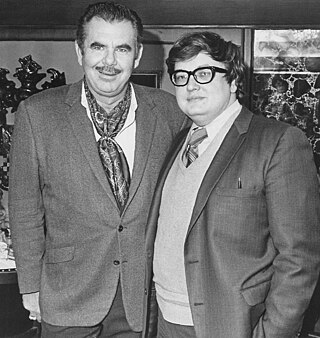
A cult film or cult movie, also commonly referred to as a cult classic, is a film that has acquired a cult following. Cult films are known for their dedicated, passionate fanbase which forms an elaborate subculture, members of which engage in repeated viewings, dialogue-quoting, and audience participation. Inclusive definitions allow for major studio productions, especially box-office bombs, while exclusive definitions focus more on obscure, transgressive films shunned by the mainstream. The difficulty in defining the term and subjectivity of what qualifies as a cult film mirror classificatory disputes about art. The term cult film itself was first used in the 1970s to describe the culture that surrounded underground films and midnight movies, though cult was in common use in film analysis for decades prior to that.

Collaborative filtering (CF) is a technique used by recommender systems. Collaborative filtering has two senses, a narrow one and a more general one.

Freddy Got Fingered is a 2001 American-Canadian surreal black comedy film directed by Tom Green in his feature film directorial debut and written by Green and Derek Harvie. Green stars in the film as a childish slacker who wishes to become a professional cartoonist while dealing with his abusive father's behavior. Its plot resembles Green's struggles as a young man trying to get his television series picked up, which would later become the MTV series The Tom Green Show. The title of the film refers to a plot point where Green's character falsely accuses his father of sexually abusing his brother, the eponymous Freddy.
A recommender system, or a recommendation system, is a subclass of information filtering system that provides suggestions for items that are most pertinent to a particular user. Recommender systems are particularly useful when an individual needs to choose an item from a potentially overwhelming number of items that a service may offer.
Metacritic is a website that aggregates reviews of films, television shows, music albums, video games, and formerly books. For each product, the scores from each review are averaged. Metacritic was created by Jason Dietz, Marc Doyle, and Julie Doyle Roberts in 1999, and is owned by Fandom, Inc. as of 2023.
Star classification is a type of rating scale utilizing a star glyph or similar typographical symbol. It is used by reviewers for ranking things such as films, TV shows, restaurants, and hotels. For example, a system of one to five stars is commonly used in hotel ratings, with five stars being the highest rating.

Rotten Tomatoes is an American review-aggregation website for film and television. The company was launched in August 1998 by three undergraduate students at the University of California, Berkeley: Senh Duong, Patrick Y. Lee, and Stephen Wang. Although the name "Rotten Tomatoes" connects to the practice of audiences throwing rotten tomatoes in disapproval of a poor stage performance, the direct inspiration for the name from Duong, Lee, and Wang came from an equivalent scene in the 1992 Canadian film Léolo.

Empire is a British film magazine published monthly by Bauer Consumer Media. The first issue was published in May 1989.

IMDb is an online database of information related to films, television series, podcasts, home videos, video games, and streaming content online – including cast, production crew and personal biographies, plot summaries, trivia, ratings, and fan and critical reviews. IMDb began as a fan-operated movie database on the Usenet group "rec.arts.movies" in 1990, and moved to the Web in 1993. Since 1998, it has been owned and operated by IMDb.com, Inc., a subsidiary of Amazon.
Product finders are information systems that help consumers to identify products within a large palette of similar alternative products. Product finders differ in complexity, the more complex among them being a special case of decision support systems. Conventional decision support systems, however, aim at specialized user groups, e.g. marketing managers, whereas product finders focus on consumers.

Film criticism is the analysis and evaluation of films and the film medium. In general, film criticism can be divided into two categories: journalistic criticism that appears regularly in newspapers, magazines and other popular mass-media outlets; and academic criticism by film scholars who are informed by film theory and are published in academic journals. Academic film criticism rarely takes the form of a review; instead it is more likely to analyse the film and its place in the history of its genre or in the whole of film history.
Cinephilia is the term used to refer to a passionate interest in films, film theory, and film criticism. The term is a portmanteau of the words cinema and philia, one of the four ancient Greek words for love. A person with a passionate interest in cinema is called a cinephile, cinemaphile, filmophile, or, informally, a film buff. To a cinephile, a film is often not just a source of entertainment as they see films from a more critical point of view.
CinemaScore is a market research firm based in Las Vegas. It surveys film audiences to rate their viewing experiences with letter grades, reports the results, and forecasts box office receipts from the data.
FilmAffinity is a movie recommendations website created in 2002 in Madrid, Spain, by the film critic Pablo Kurt Verdú Schumann and the programmer Daniel Nicolás. In 2016, the site listed 125,000 movies and series and had 556,000 reviews written by its users.
MovieLens is a web-based recommender system and virtual community that recommends movies for its users to watch, based on their film preferences using collaborative filtering of members' movie ratings and movie reviews. It contains about 11 million ratings for about 8500 movies. MovieLens was created in 1997 by GroupLens Research, a research lab in the Department of Computer Science and Engineering at the University of Minnesota, in order to gather research data on personalized recommendations.

FilmCrave is an online movie social network that allows users to write movie reviews, share movie lists, watch trailers and interact with other members. Founded by three college friends in February 2007, the site was launched in August 2007. FilmCrave is privately owned and funded by ImaJAN Media LLC, Missouri.

Saving Christmas is a 2014 American faith-based Christmas comedy film. It was directed by Darren Doane and written by Doane and Cheston Hervey, based on an original story by Kirk Cameron. It was theatrically released by Samuel Goldwyn Films on November 14, 2014.

TV Time is a tracking platform and social television network for TV and movies, available in app and desktop forms. Using TheTVDB as a data source, it allows users to store information about their media consumption and leave reviews.
Letterboxd is an online social cataloging service co-founded by Matthew Buchanan and Karl von Randow in 2011. It was launched as an app focused on sharing opinions about, and love of film, and is maintained by a small team in Auckland, New Zealand. The site allows users to share their taste in films. Members can write reviews or share their opinions about films, keep track of what they have seen in the past, record viewing dates, make lists of films and showcase their favorite films, as well as meet and interact with other cinephiles. Films can be rated, reviewed, added to a specific date's diary entry, included in a list, and tagged with relevant keywords.

Readgeek is an online book recommendations engine and social cataloging service launched in December 2010. The website allows users to search for books matching their individual taste making use of several algorithms. Taking ratings and metadata of prior read books into account, those algorithms help the site to learn about a users preferences. The service suggests books other users with similar tastes have enjoyed, rather than offering up books similar to the ones a user already ranked.










